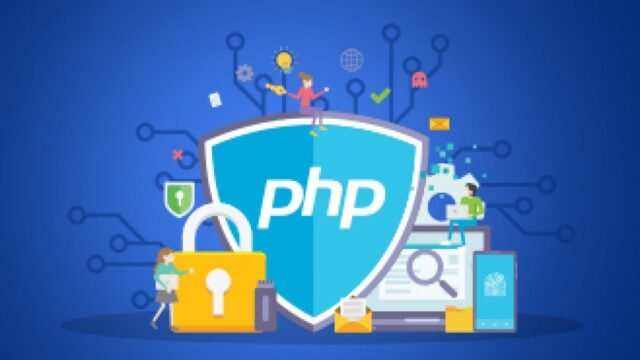PHP requires no introduction in the development industry. According to W3Techs, more than 80% of the Web sites are based on PHP. But there is no secret, that being one of the oldest scripting languages PHP security has always been criticized for having weak security, Overtime PHP security has always faced problems, and as many other languages PHP too is not free from security loopholes. A report by the National Vulnerability Database (NVD) indicates that 9% of PHP security vulnerabilities.
The modern world is working around the components such as online web banking, online payment portals, crypto currency, etc. In a world where assets are heavily dependent on being exposed to the internet world, we need to have portals that are secure and provide comprehensive firewalls to protect the information stored inside. The process involves leveraging secure development practices and implementing security measures throughout the software development life cycle, ensuring that the flows and bugs are addressed to the testing teams. Cookies are also used for security/tracking purposes. There are 2 types of cookies used by PHP, i.e Persistent Cookie and php session cookie to secure the web application.
Most Common PHP Security Vulnerabilities
Denial-Of-Service Attack (DDoS):
A DDoS attack compromises multiple computer systems attacks. The usual targets are servers, websites, or other network resources. The series of continuous incoming messages, connection requests, and the target system force the system or server to slow down or even crash and shut down. The attack master tends to target the most vulnerable parts of the system and then attack them, causing them to malfunction and bypass the authentication control room.
Cross-Site Request Forgery (CSRF):
CSRF is an attack that forces users to execute unwanted actions on a web application in which they’re authenticated. CSRF is usually done by tricking users into opening a link sent via email or chat. It inherits the characteristics and benefits of the undesired work for the victim’s sake. Therefore, in case the user is currently authenticated to the site, the location will have no way to recognize the forged ask sent by the victim. CSRF attacks target usefulness that causes a state change on the server, such as changing the victim’s e-mail address or password or acquiring something. Retrieving data doesn’t benefit an attacker because the attacker doesn’t receive the response.
SQL injection:
SQL injection is the most common security attack among all the security threats. The entire application is compromised, just by executing one single query. The hacker tries to modify the data stored within the database by altering the query executed by the user. All that’s needed to prevent this attack is to solve that single bug in the query that is making the program vulnerable.
The best way to prevent SQL injection attacks is to use parameterized queries, using placeholders to store values, and having separate instances for every value that’s needed to be stored, parameterized queries are relatively easy to write as every query is passed into a data set. This helps the program to understand the difference between query and user data.
Cross-Site Scripting (XSS):
This kind of attack is usually expected when the user has frequent access to vulnerable websites
It permits an attacker to outwit the same-origin policy, which is planned to isolate and diverse websites from each other. In case of being under attack, the victim compromises all the secure files and information that is on the application, if the victim has privileged access, the attacker will have access to all those privileges and can modify or harm the user data placed on the application or server.
There are few very effective ways to handle XSS attacks, for instance, Filter input on arrival, Encoding data output, using response header, using Content Security Policy, etc.
PHP Security Tips and Tricks
Using a firewall:
A Firewall is kind of a protection wall built around the application to protect the application from all sorts of threats and unwanted data if it filters the unwanted request and data from reaching the application or server.
Data filtering:
Data filtering is one of the most effective ways to secure your application. It secures applications from code snippets and injections. There are multiple ways to enable data filtering. Using a whistling approach and including several data combinations, or by dedicating a module to a single security server.
Multi-factor authentication:
The new security method, probably the most advanced way of securing data, the attacker can not make changes to the applications, even if the attacker has the credentials they would need to generate an OTP(one-time-password) to make changes to the application.
Security Testing:
The reason for a security review & penetration test is to distinguish all vulnerable regions in your site which can be exploited by an attacker. A penetration test moreover incorporates exploiting a vulnerability to look at its gravity. Once the test is done, it comes about offering assistance in fixing the vulnerabilities and sanitizing the application or site. These tests are moreover fundamental to guarantee that all control measures are active and successful.
Few Security services provided by Cloudways
Dedicated Firewalls:
All cloudways platforms are protected by OS-Levels firewalls that filter out
malicious traffic and intruders.
SSL Installation:
SSL encryption improves website security, cloudways provide SSL certification as an add-on and fulfills all your HTTP requirements.
Bot Protection:
It provides your website to manage flooding traffic, helping websites to manage bot requests and other malicious traffic and intruders and requests that may end up attacking data and resulting in a security breach.
Two-Factor Authentication:
An extra layer of security that makes sure and keeps the website safe from intruders and other attacks.
End-to-End Encryption:
Cloudways provide End-to-end encryption, a system of communication where only the communicating users can read the conversation.
Conclusion:
PHP Host should always keep in mind that writing secure code is more than an ability, it could be a state of intellect. You would like to be always educated on the most recent security vulnerabilities, threats, and arrangements. Examine blogs and specialized news and always apply your information within the code you compose.
The amount and significance of data entrusted to web applications are expanding, and protectors have to learn how to secure this basic information. Conventional arrange resistances such as firewalls come up short to secure web applications.









